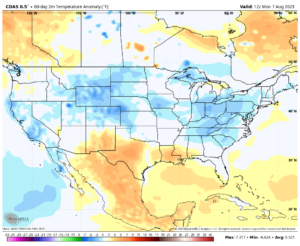The growing disconnect between climate alarmist rhetoric and real people’s experience seems to be leading to a doubling down rather than a rethinking. Judith Curry scoffed “Wow, ‘global boiling’ is even more alarming than ‘code red.’ I wonder who comes up with this stuff for Guterres”. But what’s really interesting is who uncritically repeats and amplifies it. Even if your climate analysis is done by someone with a “BA, honors in history and ethnicity, race and migration” you might think you’d get some analysis of the weirdness of all the groupthink. But instead you get a bunch of half-chewed clichés, not even cunningly devised fables. Like blaring “Heat records this summer are challenging the limits of human survival” when the vast majority of affected humans, including the writer and their friends, are surviving without trouble, partly by taking breaks in warmer places than where they live. Or the New York Times (h/t Marc Morano) yelling “Is This the End of the Summer Vacation as We Know It? This year, everything from scorching heat to fires, floods, tornadoes and hail storms driven by climate change have disrupted the plans of travelers around the world.” Yet people are vacationing more than ever, including we wager the Times’ own staff.
Even elementary journalistic skepticism seems to have gone up in flames. Including the Times journalist who knew while writing that piece, and indeed included in it, that “Despite all the crises, global arrivals – the total number of tourists who cross a border – are projected to be up 30 percent from last year, according to the Economist Intelligence Unit, a research division of the media company.” And, as we noted, the egregious example of a Lancet chart that stretched one side of the X-axis, something no halfway sensible researcher or editor should have tried and no halfway sensible commentator should have overlooked. (Though we ourselves did, and fessed up.) It has brought them disrepute not new believers.
A rather more subtle example of chart manipulation, as Alex Epstein observes, is stretching the Y-axis so a vanishingly small rise in temperature turns into the side of Mt. Everest; as he notes, it is “like measuring weight gain on a scale where 1 lb is huge.” But it’s not a conspiracy or a scam. These manipulations are happening, and being shared credulously, because activist scientists and activist journalists are sure what they purport to show is real, not because they’re sure it’s not. And it’s a lot more subtle than switching back from metric to the supposedly absurd Fahrenheit in order to get from two to three digits, which is also going on.
They see what they expect to see, not what they know is not there, and they don’t look hard enough to spot even obvious holes. For instance Global News writing “Climate change is already affecting food security. How can Canadians prepare?” when the global population has never been larger or better fed, and neither has ours. Conspirators would find more subtle approaches, unless they were raving idiots, confined to an asylum such as Radio Moscow, or deliberately engaging in sabotage from within. Instead the Guardian hollers “Global heating likely to hit world food supply before 1.5C, says UN expert” and emails a funding pitch that: “A recent scientific paper showed that climate breakdown is drastically increasing the chances of simultaneous crop losses in the world’s poorest nations. The effects of this could be devastating.”
Hoaxers would also be wary of writing for 20 straight years, and now retweeting triumphantly, that the evidence finally and conclusively arrived this year. As in:
“The knowledge that you might soon be choked with forest-fire smoke, roasted on the sidewalk, flooded out of house and home or savaged by tornadoes and hurricanes tends to concentrate the mind wonderfully. As this summer of catastrophic weather events and raging infernos reaches its midway point – it’s only half over! – you can’t help noticing the shift in the way people talk about climate change.”
Roasted on the sidewalk. Right. It’s a barbecue out there. Meanwhile (as also noted in a previous item) the actual temperatures from mid-June to mid-August were cool compared to the past 30 years over most of the US and south-central Canada:

(h/t Joe Bastardi).
The same consideration that if it were a conspiracy they’d have been more careful about their fakery is true of the BBC claiming a temperature of 48.2°C in Jerzu, Sardinia on July 24, when the Italian military data says 41. Or the Washington Post shrieking “In hot water: South Florida ocean tops 100 degrees; could be world record” when actually it’s not even the highest temperature at that particular station in the last six years. Which didn’t stop NBC from writing:
“The water temperatures recorded Sunday and Monday would challenge the record for hottest sea surface temperature in the world. While official world water temperature records aren’t kept, a 99.7 degree temperature recorded in Kuwait Bay is considered the world record at this time.”
So there isn’t even a world record. But if there were, this one wouldn’t be it. If only journalists knew.
On and on it goes. For instance Steve Milloy, again, roasts Bloomberg for saying “This summer has been the hottest in recorded human history” when, actually, “June 1998 was warmer than June 2023. The 1930s were warmer. Then there’s the Medieval Warm Period and before. BTW, Temperature.global’s actual temperature measurements has had the globe at a steady temp around 57.5°F all year.” It’s not as though somebody would not predictably check.
As Roger Pielke Jr. asked about that Post shriek, “When did journalists and editors stop doing journalism and start turning incorrect but viral Tweets into headlines?” And the answer is not when they became characters in a Dan Brown novel.
We make the same claim about the herd of independent minds all suddenly declaring that “Climate Collapse Could Happen Fast” (the Atlantic). Or “Gulf Stream could collapse as early as 2025, study suggests” (the Guardian and related tweet, reprinted on MSN). There was a time when, if a media outlet kept running exactly the same story as its competitors, the managing editor would have taken staff to the woodshed about breaking original stories and finding original angles. Not any more, and not just because the economics of the business are so unfriendly they’re mostly living by the same wire stories.
Nor is it because they’re coordinating a fraud. It’s that they all think alike. (Amusingly many people have repeated many attributions of the line that “Where all think alike, no one thinks very much” without thinking about it, though the Quote Investigator did and believes it was originally phrased in 1886 as “When everybody thinks alike there is hardly any incentive to think at all” by that creative genius “Anonymous”.)
Now to be fair the New York Times wrote that “Warming Could Push the Atlantic Past a ‘Tipping Point’ This Century” and claimed “Climate scientists generally agree that the Atlantic circulation will decline this century, but there’s no consensus on whether it will stall out before 2100.” Which isn’t 2025 unless climate change has also wrecked the calendar.
Still, it plods that:
“The new research, published on Tuesday in the journal Nature Communications, adds to a growing body of scientific work that describes how humankind’s continued emissions of heat-trapping gases could set off climate “tipping points,” or rapid and hard-to-reverse changes in the environment.”
And spreads some low-rent panic by saying the researchers du jour:
“then used the mathematical properties of a tipping-point-like system to extrapolate from these trends. That led them to predict that the Atlantic circulation could collapse around midcentury, though it could potentially occur as soon as 2025 and as late as 2095.”
Could. Potentially. Or not.
On Heatmap Neel Dhanesha, “a graduate of the Literary Reportage program at NYU“, stumbled into the same trap with a headline “Why It’s So Hard to Predict a Climate Tipping Point” over the subhed “There’s disagreement about when the Atlantic Ocean current will collapse.” Though of course in this welter of uncertainty there’s actually disagreement about whether it will, never mind when.
As he semi-concedes, with:
“Scientists have long worried that what used to be a steady exchange of warm and cold water between the tropics and the North Atlantic is being disrupted by cold freshwater from melting Arctic ice, and could even shut down entirely, sending Northern Europe into a deep freeze and causing even more extreme heat to hit tropical regions.
Could. Not will. But don’t worry because there’s more certain uncertainty:
“What scientists haven’t agreed on, however, is when the AMOC might stop, though the latest report from the Intergovernmental Panel on Climate Change, or IPCC, predicted it should hold out through the end of the century. A new study, published Tuesday in Nature Communications, says otherwise: the AMOC, its authors say, will reach its ‘tipping point’ by the middle of this century, and could collapse sometime between 2025 and 2095. If it does, it would bring rapid changes to the world’s climate of a type that haven’t been seen in over 12,000 years.”
Could. If. And also, to nitpick, was the one seen over 12,000 years ago caused by CO2? Never mind. And never mind the “settled science” because:
“When we first got these results, we didn’t believe them ourselves,” said Susanne Ditlevsen, a mathematician at the University of Copenhagen and co-author, with her brother Peter Ditlevsen, of the new paper. ‘We were thinking that there’s something wrong in what we’re doing because we got estimates that are so off compared to the IPCC.’”
Which knows all and sees all, or so we were being told until this frenzy erupted. But actually the settled science isn’t settled:
“It’s a striking study, and it can make us feel like catastrophe is not only looming but irreversible. But in many ways, this study is a microcosm of the many challenges that come with trying to predict – and speak definitively about – how our planet will change in the future.”
So how come once something happens you all say you saw it coming through what is, actually, a fog of uncertainty? For instance:
“The IPCC report’s prediction, which it issued with ‘medium confidence,’ is based on climate models that use supercomputers to simulate the physical processes that will change as the climate changes. Looking at those models, we see a gradual weakening of the AMOC over time rather than a sudden tipping point that leads to a collapse.”
Except if you do your homework you know “medium confidence” doesn’t mean, as it seems, to, that they’re quite confident. It means it’s 50-50. A coin toss. Anybody’s guess. And everybody’s sudden obsession.



People who pump the same narrative can have diverse motives, and different knowledge bases. No doubt there are earnest zealots who sincerely believe that a catastrophic climate apocalypse is upon us, and are making a last-ditch effort to stem the tide. But it would be foolish to think that there aren't also others who are merely going along to get along, who are cashing in on the funding bonanza, who don't believe the scare stories but think they are necessary to goad a selfish population into environmental action that has other benefits, who are using the issue to drive political wedges, who are grifting opportunists, who follow every trend, etc. Something as big as climate has become will inevitably attract all types. The point is that everyone who isn't a die-hard earnest zealot is pursuing the catastrophe-climate agenda with oblique motives or out of ignorance, which puts them in the hoaxer camp, to one degree or another. The existence of so many types of people provides fertile soil for the biggest grifters and opportunists. One doesn't need zoom meetings or conferences to have conspiracies when everyone knows their part in the morality play.
The author makes his own counterargument to this not being a conspiracy. The same thoughts -> no thinking observation is key here. The special sauce here is 'social conformity'. These two are what keeps cult leaders in power, keeps big secrets hidden for longer than expected and it can create a big following for a conspiracy of a few.
The UN and associates have been pushing climate alarmism for ages now and they have been downplaying climate realism in the same period as they got more traction. This is why the first IPCC report actually contained fairly neutral conclusions, but each subsequent report they turned the knob a bit more towards alarmism.
At this point in time, writing publicly about climate realism is so socially unacceptable that your career will end.
The conspiracy is NOT with those that fall in line with social pressure or even with basic economic pressure (ie greed), it's with those that created the *ahem* climate of alarmism that we now live in, for whatever reason, through long-term manipulation.
Once enough people fall in line and start unquestionably repeating the mandatory propaganda out of fear for their own job as well as because they simply don't know THAT they can think for themselves, it's just cult leaders (very few) and cult followers (very many). This leaves those watching from the outside to wonder not only why these people seem intent on destroying themselves (which is what cults do, so sort of expected), but why they're so intent on dragging the rest of us with them.
TLDR: unthinking masses are not 'in' on the conspiracy of their masters, but will eagerly comply and force others to comply
Never attribute to conspiracy what may be adequately explained by flocking behavior.
From the Neel Dhanesha Heatmap article, "[I]t’s possible the models used by the IPCC are too conservative." Said no true scientist ever.
Carefully chosen words to create alarm, like "Global Boiling," may be the creativity of a lone, climate "gunman," and the use of those same words or phrases across dozens of platforms could be the result, as Bill Mullins suggests, of flocking behavior, but we have to step back for a moment and ask: What is a conspiracy?
conspiracy n. -- A conversation between two or more people for the purpose of doing something unethical or illegal.
That such a topic would become the target of such ridicule or unnatural urges to distance ourselves from them is something that might be worthy of examination. Certainly, "flocking" is a very real behavior, but so are conspiracies. In fact, people are so selfish, across the planet and throughout history, that BIG, selfish projects require the collaboration of multiple, selfish people. And like the IPCC's unnatural Terms of Reference which put blinders on scientists so as to consider only anthropogenic causes, we must not also fall into the madness of ignoring one of the more common of human behaviors -- selfishness, and its extension into the group setting -- conspiracy.
Most assuredly, conspiracy is not the only dynamic involved. But when we have evidence of at least 489 new conspiracies starting every Second, on average, the notion that this human activity is a "fantasy" to be avoided is shown to be blatantly false. Sort of like using only reds and oranges on your weather map, or taking a perfectly fine word like "square," which means honorable and full of integrity, and adding a new, more toxic meaning: "boring, boorish and backward."
Was it merely some oddball creativity and people flocking together to repeat the cleverness? Or did someone have a specific, perhaps even dark purpose behind such things as using more alarming wording -- "making the oceans more acidic," rather than "making the oceans more neutral?" Both of these statements are literally true, but the former creates a far more jolting punch. No one wants to be swimming in acid.
What do we lose by blinding ourselves? "Oh, don't talk about conspiracy!" Or, "not everything is a conspiracy." While true, not everything is chicken pot pie, either.
Solving a problem requires that we look at all of the elements involved; not just the comfortable ones.